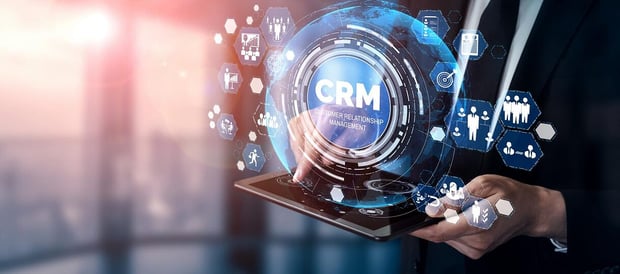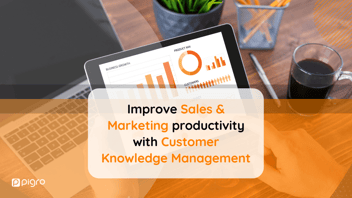To manage customer relations in the company, it must be possible to access all the necessary information on sales data, marketing content, customer journey, requests for assistance etc. For this reason, it is essential to have an efficient management system of business knowledge.
To get a Knowledge Management strategy tailored to your needs, contact one of our Pigro experts free of charge. Otherwise, continue reading the article to learn more.
Establishing a Wholistic Connection with Customers
A holistic customer relationship is crucial for businesses looking to establish long-lasting connections with their customers. It involves a comprehensive approach to customer relationship management (CRM), focusing on various aspects of the customer journey. By adopting a holistic approach, businesses can better understand their customers' needs and provide tailored solutions to meet those needs.
In a holistic customer relationship, the entire organization places the customer at the center of its operations. This customer-centric approach enables businesses to collect valuable information about their customers, such as their preferences, habits, and feedback. By gathering this data, businesses can develop a deep understanding of their customers and deliver personalized experiences that resonate with them.
Implementing a holistic customer relationship requires the integration of CRM strategies across different business areas. This includes aligning processes, technologies, communication channels, and data collection methods to ensure a seamless customer experience. By doing so, businesses can optimize their marketing, sales, and after-sales departments, resulting in improved customer satisfaction and loyalty.
In terms of marketing, a holistic customer relationship allows businesses to collect and analyze customer data more effectively. This data can then be used to create targeted marketing campaigns that resonate with specific customer segments. By leveraging marketing automation and workflow functions, businesses can streamline repetitive marketing activities and optimize their resources.
For sales departments, a holistic customer relationship enables a thorough understanding of the entire sales cycle. From the initial contact with a potential customer to the conversion of a lead into a loyal customer, businesses can track interactions and steps along the way. This comprehensive view of the sales process empowers sales agents to make informed decisions and plan follow-up activities effectively.
Similarly, in the after-sales department, a holistic customer relationship fosters better communication and support between the company and its customers. By utilizing CRM systems that focus on customer conversations, such as emails and phone calls, businesses can provide timely assistance and address customer needs efficiently. Automation plays a crucial role in this process, ensuring prompt responses and the recording of relevant customer information.
To implement a holistic customer relationship successfully, businesses should also consider incorporating knowledge management into their CRM strategies. Knowledge management involves collecting, organizing, and sharing the company's collective knowledge to improve productivity and efficiency. By adopting a knowledge base management system, businesses can centralize their know-how and facilitate knowledge sharing across all departments. This enables employees to access the information they need to provide exceptional customer service and drive customer satisfaction.
In summary, a holistic customer relationship is a vital component of a successful CRM strategy. By prioritizing the customer's needs, businesses can enhance their marketing efforts, streamline their sales processes, and provide exceptional after-sales support. By integrating knowledge management into their CRM strategies, businesses can further optimize their operations and deliver personalized experiences that set them apart from the competition. A holistic customer relationship is the foundation for building strong and long-lasting connections with customers, ultimately driving business growth and success.
Customer Relationship Management to retain customers
In the other article about CRM, we introduced the concept of Customer Relationship Management, giving a definition of CRM: a real business strategy to implement in more levels and business areas, aimed to establish long-lasting customer relations.
This strategy can affect different business macro-areas, depending on whether it is more focused on process, technologies, communication or collecting data, and is essential for some elements within the company, including the corporate culture.
The goal is in fact to use a customer-centric approach, thanks to which the whole organization places the customer at the centre, to collect information about his needs, so as to offer solutions that meet his necessity as much as possible.
Main CRM benefits for the corporate division
CRM can be devised by focusing on different aspects of the Customer Journey cycle. For this reason, we talk about CRM systems, that involve directly some business areas in close contact with customers and indirectly the entire organization, and can be implemented thanks to the use of specific software.
A CRM software can therefore support the Marketing, Sales and After-sales departments bringing various benefits:
-
Marketing: marketing-oriented CRM software allows you to collect and analyze customer data more easily, to make more effective marketing actions. In particular, all those contact information (such as birth date, geolocation, favourite products, habits, etc.) will be able to guide marketing campaigns aimed at a particular target more efficiently.
Thanks to marketing automation and workflow functions, the resources dedicated to all those repetitive activities, such as sending emails or posting on social media, can be optimized.
If they are then included in an Inbound perspective (that is, the creation of value for the customer), which also involves the sales and after-sales departments, it will be even easier to transform the leads acquired through marketing into customers;
-
Sales: in the Sales area, the CRM can be useful for following all the phases of the sales cycle. Starting from the first contact with the potential customer, it is possible to trace interactions and steps, to reach the conversion of the prospect into an acquired customer.
Commercial agents can, in fact, also benefit from the analysis of the marketing actions that brought the lead into contact with the company, and thus plan all follow-up activities on ongoing negotiations;
-
After-sales: Some CRM systems focus on conversations between customers and the company team, such as emails or phone calls exchanged with Customer Service and Helpdesk.
Also in this case, automation can play a fundamental role, since the customer is supported through various channels such as call centres, emails, ticket portals and FAQs.
Customer Service operators will be able to respond more quickly to requests that require their intervention, recording all information relating to customer needs.
An effective Customer Relationship Management system, therefore, represents a useful tool for collecting, analyzing and sharing databases and information between multiple divisions, so that the company can improve the products and services offered or identify any gaps.
All the data collected must be monitored to ensure that it is usable and up-to-date. To automate this task, Pigro has developed Knowledge Insights, a feature that allows you to analyze accessibility, usability, status of updates, knowledge gaps, etc. of the company’s knowledge base. Thanks to targeted insights it is possible to improve the quality of content and thus increase the efficiency of business departments.

How to improve CRM processes with Knowledge Management
In the past, it was thought that Customer Relationship Management and Knowledge Management were different disciplines in their own right.
Today, however, any company that wants to be competitive in the market knows that having an entire capital of knowledge at its disposal, from which to draw information, allows employees of the various company teams to carry out their work more quickly.
It can be said that access to information helps to ensure productivity.
When the CRM system is supported by a Knowledge Management System, all company departments benefit from it. How?
First of all, the company's know-how is collected in a single container, thus avoiding the clustering of information and the creation of silos, which make knowledge difficult to access between various repositories.
All employees (and managers) will then be able to keep track of the procedures and best practices they use daily for problem-solving. Everything related to one's own workplace experience can be recorded and passed on, without risking the loss of fundamental implicit knowledge.
By adopting a Knowledge Base management system, it will therefore also be easier to implement Customer Relationship Management: all company departments will be able to easily collect, use and share the information they need to perform their work in the best possible way, including that of customers.
Customer Knowledge as a starting point for Customer Relationship Management
We have therefore seen how every activity within the company assumes the use and access to knowledge.
The so-called Customer Knowledge is the set of information and data collected about a customer. It is a part of the CRM knowledge base and it is essential for planning a CRM strategy. It can be diversified into 3 categories:
-
Knowledge about customers, or information related to them, which allows us to offer solutions for their needs;
-
Knowledge for customers, that is, the need for information that drives a customer to interact with the company;
-
Customers' knowledge, or the perception of the company and the products and services purchased, which customers can provide in the form of feedback. A valuable resource for the company, as it allows for improvement.
These 3 types of knowledge must possess fundamental requirements to be such: they must be significant from a business point of view, they must be measurable and consistent and be integrated into the business processes to be able to build an effective CRM strategy on them.
How to implement Customer Knowledge Management
When a Knowledge Management strategy supports the Customer Relationship Management one, the entire organization can optimize the use of resources, improving productivity and competitive advantage.
When the two strategies are, in fact, in close synergy with each other, we speak of Customer Knowledge Management (CKM).
To implement the management of knowledge related to customers, it is necessary to follow 4 steps:
-
Choose the appropriate communication channels, to be used to collect useful information about customers;
-
Collection and categorization of data and knowledge thus obtained, in order to share them with other employees within the company;
-
Transfer of this knowledge to top management, so that informed decisions can be made, and more and more products and services customized;
-
Translate this knowledge into customer acquisition and loyalty, offering solutions that meet their needs.
Today Customer Satisfaction is based on the ability of companies to respond to consumer requests for fast and personalized services. For this, each organization must be able to respond quickly to changes in the surrounding environment and optimize its resources to always ensure the best result.
By exploiting the combination of Knowledge Management with CRM it will be possible to have easy and fast access to all the information necessary to speed up processes, improve productivity and therefore be more agile in the market.
Read also: Focus on Customer Relationship Management
How to improve your Sales and Marketing productivity with Customer Knowledge Management
Do you want more information about Pigro? Contact us!



